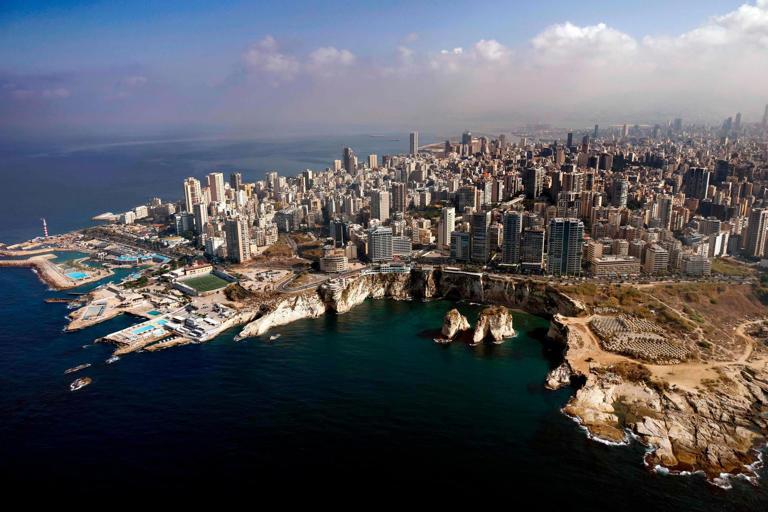
Why did the US sanction the Rahme brothers?
The US has imposed sanctions on two Lebanese businessmen for profiting from public corruption, the Treasury Department announced on Tuesday evening.
Brothers Raymond Zina Rahme and Teddy Zina Rahme used their wealth, power and influence to engage in corrupt practices that contribute to the breakdown of the rule of law in Lebanon, thereby undermining Lebanon’s democratic processes to the detriment of the Lebanese people, the department has alleged.
The Rahme brothers are prominent businessmen who own massive properties in Lebanon and have a wide network of political connections.
“At a time when the Lebanese people face significant economic distress, a dire energy crisis, and unprecedented political dysfunction, the Rahme brothers have used their business empire and political connections to enrich themselves at the expense of their fellow citizens,” the department said.
It is not the first time the Rahme brothers found themselves in the spotlight of the US justice system.
In 2019, a US court ruled that Raymond Rahme was illegally introduced as a middleman between the Iraqi state and Wye Oak, a company managed by a US contractor, Dale Stoffel, and condemned the Iraqi government to pay over 90 million dollars in penalties.
The case dates back to 2004 when the Iraqi Ministry of Defense granted Wye Oak a contract to rehabilitate military equipment after the war in Iraq.
It gained significant media attention because of the death of Dale Stoffel in unresolved circumstances. Before his death, Mr Stoffel had accused Raymond Rahme of obstructing a $20 million transfer since he refused to participate in an alleged kickback scheme, which he claimed benefited some officials in the Defense Ministry.
The murder was officially claimed by a terrorist group and the US court did not rule on the matter.
The tainted fuel scandal
The recent US decision is linked to the tainted fuel scandal, which broke in Lebanon in April 2020.
ZR Energy DMCC, the company controlled by the two brothers, was subcontracted in 2017 by a subsidiary of Sonatrach Petroleum Corporation (SPC) to import fuel for Electricite du Liban (EdL), the state-owned national electricity utility in Lebanon.
These are extremely lucrative contracts. The cost of supplying fuel to all EdL plants exceeded $1.6 billion in 2018, according to World Bank data.
But it was later discovered that Lebanon was paying a steep price for low-quality fuel, while the country was grappled with constant power outages and reeling electric infrastructure.
Indeed, after many warnings from the power plants’ operators about the fuel quality, tests were finally conducted at Lebanese laboratories revealing that the fuel delivered by ZR Energy DMCC was non-compliant, even though a quality certificate was issued at the loading port.
“The Rahme brothers, through their UAE-based company ZR Energy DMCC, passed off their dangerously compromised fuel product by blending it with other fuels,” the US Treasury wrote.
This led to the opening of an investigation in Lebanon in 2020, which exposed an alleged years-long corruption scheme involving laboratory employees and high-ranking officials of the Energy Ministry. This scheme involved the falsification of test results in exchange for bribes.
In addition, the investigation highlighted several contractual violations. The terms of the agreement signed in 2005 for three years were initially kept secret.
The contract was presented as a state-to-state agreement and renewed in complete opacity five times by the Council of Ministers without any bidding process.
At that time, it was not known that Sonatrach BVI had subcontracted the fuel import to ZR Energy DMCC, which, the investigation said, was a violation of Lebanese laws since it had not been mentioned in the contract.
A trial was opened in May 2021 in Lebanon, with Teddy Rahme facing bribery accusations. However, the trial has yet to progress due to judge strikes and delays in the judicial process.
Some people believe that their political influence has contributed to the slow pace of the local justice system.
Sleiman Frangieh, the leader of Marada, a Christian party allied with Hezbollah, publicly expressed his “friendship” towards Raymond Rahmeh amid the tainted fuel scandal, whereas Teddy Rahmeh is known for his ties with the Lebanese Forces, a Christian political party standing at the other end of the political spectrum.
Another pitfall for the Lebanese judiciary was to prove the link between ZR energy DMCC, officially owned by their commercial partner, Ibrahim Zouk and the Rahme brothers.
The Rahme brothers denied any wrongdoing, claiming that ZR Energy is not part of their holding, ZR Group Holding. They have consistently maintained that they are not involved in fuel importation in Lebanon.
The US Treasury’s recognition of the Rahme brothers as the real owners of ZR Energy DMCC marked a major step in the case
“While the Rahme brothers enriched themselves with this scheme, the Lebanese people suffered, and the country’s infrastructure further deteriorated. Power stations across Lebanon increasingly malfunctioned and daily electricity cuts increased”, the department said.
Source: msn





